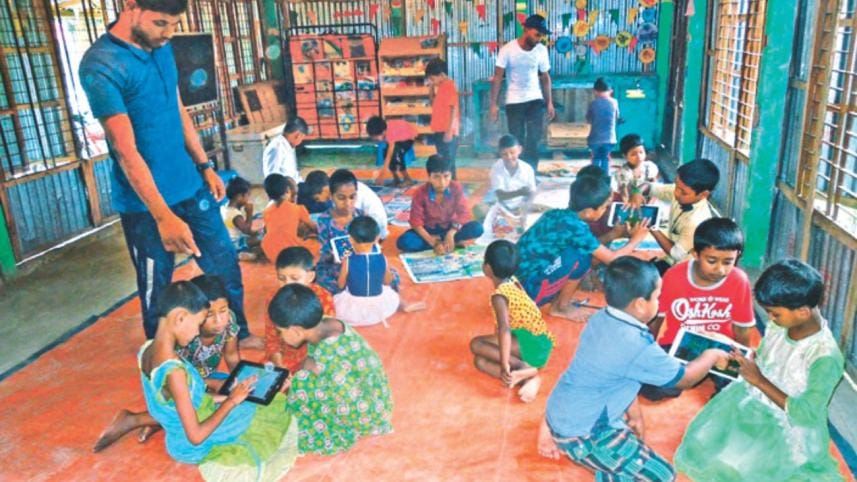A library for labour welfare

At first glance, Purbo Daliram in Garagram union of Nilphamari's Kishorganj upazila looks like any village. But it is home to a unique self-generated development initiative.
In 2010, a group of 13 friends from former high school days took it upon themselves to found a public library, with the goal of fostering knowledge. It marked the start of ongoing education and social awareness campaigns that have transformed Purbo Daliram into a dynamic village success story.
More impressive, the enthusiastic volunteers haven't been afraid to get their own hands dirty. Activities are primarily funded by the donated wages they earn as part-time farm workers.
“At first we established the library,” recalls Tawfiqul Islam Mishu, 23, a college student who is also the president of the library management committee. “We decided to call it the Labour Welfare Public Library since we wanted to highlight the dignity of labour and make the library welcoming for farming families. We ourselves worked as farmhands for quite some time to earn money to buy the books.”
“It isn't only the 13 of us anymore,” adds Imam Hosain Imu, also 23, who is the library's secretary. “We have 200 associate members. We still earn money through field work, to support social campaigns against drug abuse, gambling, early marriage and dowries.”
The results of their initiatives thus far are impressive. In Purbo Daliram, no child goes without schooling anymore. All students are taught basic information technology skills. All have access to free tutorial support and students from struggling families are offered financial assistance too.
Understandably, their success has attracted well-deserved attention. “We worked on a children's education programme with the library committee,” says Md Akidul Islam, a deputy director with the international non-government organisation Save the Children. “It was a good experience.”
“Save the Children provided the library with six tabs last year and we have downloaded 30 different educational apps that help children learn,” says Imam.
Local administrators are likewise impressed. “The social work volunteers from Purbo Daliram never run after government funds,” notes Mehedi Hasan, the upazila nirbahi officer in Kishorganj. “They earn their own money through farm work. I rely on their sincerity.”
“Purbo Daliram is largely free of the usual social ills,” observes the chairman of Garagram union council, Maruf Hossain. “Full credit for such an impressive achievement must go to the young change makers who established the library.”
A few months ago, the director general for public libraries, Ashis Kumar Sarker along with the cultural affairs minister, Asaduzzaman Noor, visited the village to see the library firsthand. On the day, the minister donated Tk 50,000 for the institution's continued development.
Recognition has been also forthcoming from the prime minister's information and communication technology adviser Sajeeb Wazed Joy, with the library included as a finalist in the 2017 Joy Bangla Youth Awards.
Meanwhile at the library it's hardly the accolades that the young library-goers have in mind. A group of children sit on the floor busily working apps on the library tabs. “It's really fun,” says one of them, seven-year-old Shila Akhtar. “I can draw a colourful picture on the screen.” Like the other children she takes such activities for granted. Purbo Daliram, as they experience it, is simply a village that likes nothing more than to help itself.



 For all latest news, follow The Daily Star's Google News channel.
For all latest news, follow The Daily Star's Google News channel.
Comments